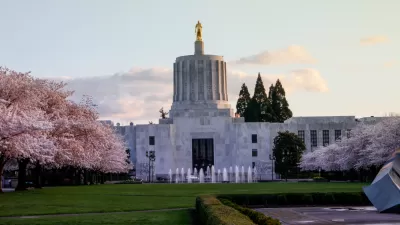The Waxman-Markey bill doesn't apportion the revenues received from the sale of carbon credits, a key issue yet to be decided. Renewable electricity, greener cars, low carbon fuels, and a carbon reduction goal are all parts of this comprehensive bill
"The draft measure, written by Representatives Henry A. Waxman of California and Edward J. Markey of Massachusetts, sets a slightly more ambitious goal for capping greenhouse gases than Mr. Obama's proposal.
The bill would require every region of the country to produce a quarter of its electricity from renewable sources like wind, solar and geothermal by 2025.
The bill also calls for modernization of the electrical grid, production of more electric vehicles and significant increases in efficiency in buildings, appliances and the generation of electricity.
But the Waxman-Markey proposal does not address two of the most difficult issues in any global warming plan: the distribution of pollution allowances and a specific timetable for achieving emissions reductions. It also does not say how most of the tens of billions of dollars raised from auctioning pollution permits would be spent, or whether the revenue would be returned to consumers to compensate for higher energy bills. Those matters have been left to negotiations,
Under Mr. Obama's plan, roughly two-thirds of the revenue from pollution permit auctions would be returned to the public in tax breaks. Some members of Congress from both parties want to see all the revenue from any carbon-reduction plan returned to the public in some form."
A coalition of business and environmental groups, the United States Climate Action Partnership, welcomed the measure as a "strong starting point" for addressing greenhouse gas emissions and said it had incorporated many of its recommendations."
From Congressional Discussion Draft Summary:
"One key issue that the discussion draft does not address is how to allocate the tradable emission allowances that restrict the amount of global warming pollution emitted by electric utilities, oil companies, and other sources. This issue will be addressed through discussions among Committee members."
Thanks to Ned Ford
FULL STORY: Democrats Unveil Global Warming Bill

Alabama: Trump Terminates Settlements for Black Communities Harmed By Raw Sewage
Trump deemed the landmark civil rights agreement “illegal DEI and environmental justice policy.”

Study: Maui’s Plan to Convert Vacation Rentals to Long-Term Housing Could Cause Nearly $1 Billion Economic Loss
The plan would reduce visitor accommodation by 25% resulting in 1,900 jobs lost.

Why Should We Subsidize Public Transportation?
Many public transit agencies face financial stress due to rising costs, declining fare revenue, and declining subsidies. Transit advocates must provide a strong business case for increasing public transit funding.

Wind Energy on the Rise Despite Federal Policy Reversal
The Trump administration is revoking federal support for renewable energy, but demand for new projects continues unabated.

Passengers Flock to Caltrain After Electrification
The new electric trains are running faster and more reliably, leading to strong ridership growth on the Bay Area rail system.

Texas Churches Rally Behind ‘Yes in God’s Back Yard’ Legislation
Religious leaders want the state to reduce zoning regulations to streamline leasing church-owned land to housing developers.
Urban Design for Planners 1: Software Tools
This six-course series explores essential urban design concepts using open source software and equips planners with the tools they need to participate fully in the urban design process.
Planning for Universal Design
Learn the tools for implementing Universal Design in planning regulations.
Caltrans
Smith Gee Studio
Institute for Housing and Urban Development Studies (IHS)
City of Grandview
Harvard GSD Executive Education
Toledo-Lucas County Plan Commissions
Salt Lake City
NYU Wagner Graduate School of Public Service




























